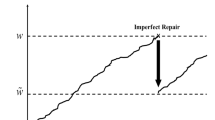Abstract
The availability of a stochastic repairable system depends on the failure behaviour and on repair strategies. In this paper, we deal with a general repair model for a system using auxiliary counting processes and corresponding intensities which include various degrees of repair (between minimal repair and perfect repair). For determining the model parameters we need estimators depending on failure times and repair times: maximum likelihood (ML) estimator and Bayes estimators are considered. Special results are obtained by the use of Weibull-type intensities and random observation times.
Similar content being viewed by others
References
Andersen PK, Borgan Ø, Gill RD, Keiding N (1993) Statistical models based on counting processes. Springer Verlag New York
Aven T (1986) Bayesian inference in a parametric counting process model. Scand J Statist 13:87–97
Bain LJ, Engelhardt M (1986) On the mean time between failures for repairable systems. IEEE Transac on Reliability R-35/4:419–422
Block HW, Borges WS, Savits TH (1985) Age-dependent minimal repair. J Appl Prob 22:370–385
Brémaud P (1981) Point processes and queues. Springer New York
Brown M, Proschan F (1983) Imperfect repair. J Appl Prob 20:851–859
Franz J (1977) Niveaudurchgangszeiten zur Charakterisierung sequentieller Schätzverfahren. Math Operationsforsch Statist Ser Statistics 8/4:499–510
Franz J (1991) On a Bayesian Rao-Cramer-type inequality — a discussion in special reliability models. WZ TU Dresden 40/2:161–163
Franz J, Magiera R (1990) Admissible estimators in sequential plans for exponential-type processes. Scand J Statist 17:275–285
Franz J, Winkler W (1987) Efficient sequential estimation for an exponential class of processes. In: Sendler W (ed) Contributions to Statistics 123–130 Physica-Verlag Heidelberg
Ghitany ME, Maller RA (1992) Asymptotic results for exponential mixture models with long-term survivors. Statistics 23:321–336
Härtler G, Schäbe H (1989) Inference for parametric families of nonhomogeneous Poisson processes. Preprint 89-5 AdW DDR ZfE
Härtler G (1983) Statistische Methoden für die Zuverlässigkeitsanalyse. Verl Techn Berlin
Hjort NL (1986) Bayes estimators and asymptotic efficiency in parametric counting process models. Scand J Statist 13:63–85
Hollander M, Presnell B, Sethuraman J (1992) Nonparametric methods for imperfect repair models. Ann Statist 20:879–896
Hurt J (1982) On estimation in the exponential case under random censorship. Proc 3rd Pannonian Symp. on Math Stat, Visegrád Hungary 115–124
Jacod J (1975) Multivariate point processes. Z Wahrsch verw Gebiete 31:235–253
Kijima M (1989) Some results for repairable systems with general repair. J Appl Prob 26:89–102
Liptser RS, Shiryayev AN (1978) Statistics of random processes, vol II Springer New York - London
Lam Y (1988) A note on the optimal replacement problem. Adv Appl Prob 20:479–482
Nishida T, Uematsu K (1987) One unit system with a failure rate depending upon the degree of repair. Math Japonica 32:139–147
Pruscha H (1985) Parametric inference in Markov branching processes with time-dependent random immigration rate. J Appl Prob 22:503–517
Shaked M, Shanthikumar JG (1986) Mulivariate imperfect repair. Operat Res 34:437–448
Stadje W, Zuckerman D (1991) Optimal maintenance strategies for repairable systems with general degree of repair. J Appl Prob 28:384–396
Svensson A (1990) Asymptotic estimation in counting processes with parametric intensities based on one realization. Scand J Statist 17:23–33
Willing R (1987) Semi-sufficiency in accelerated life testing. In: Viertl R (ed) Probability and Bayesian statistics. Plenum Press New York
Author information
Authors and Affiliations
Rights and permissions
About this article
Cite this article
Bathe, F., Franz, J. Modelling of repairable systems with various degrees of repair. Metrika 43, 149–164 (1996). https://doi.org/10.1007/BF02613904
Received:
Revised:
Issue Date:
DOI: https://doi.org/10.1007/BF02613904




